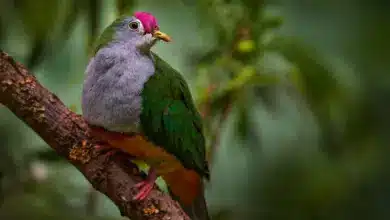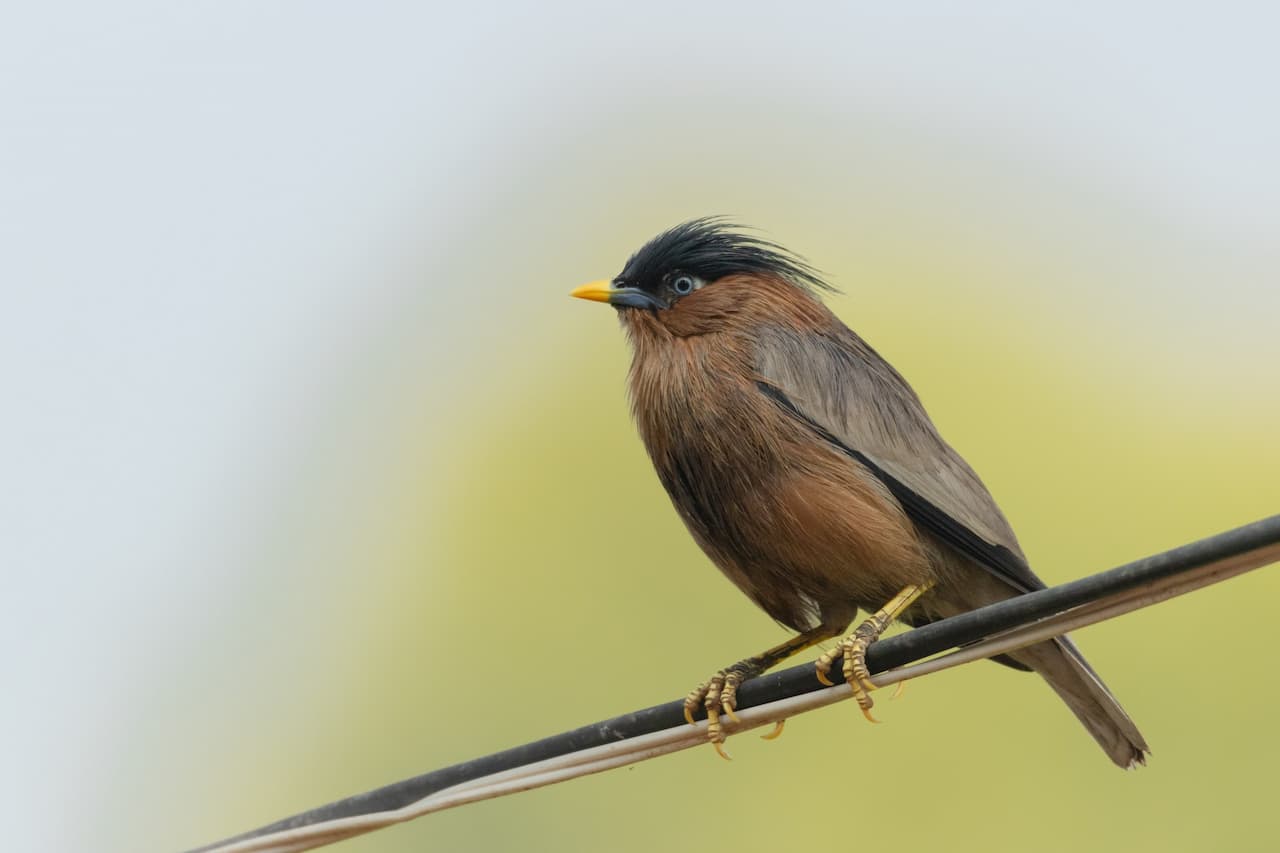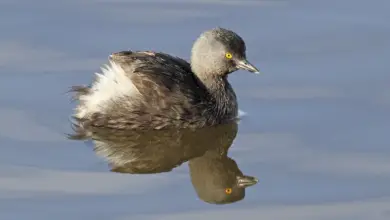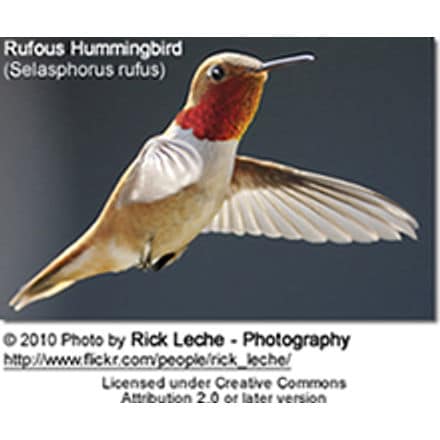Raising Muscovy Ducks: 1st Person Account Of Do’s And Don’ts
Read this first-person account from our writer, Jack Emery in what all you need to know about raising Muscovy Ducks.
A bright red, warty, and, dare I say, ugly face is not everyone’s cup of tea.
But if you are a Muscovy duck, these attributes are irresistible.
Native to Central and South America, Muscovy ducks are now highly domesticated and can be found across the globe.
If cared for properly, they make great pets. This guide will explore everything you need to know about Muscovy ducks and how to care for them.
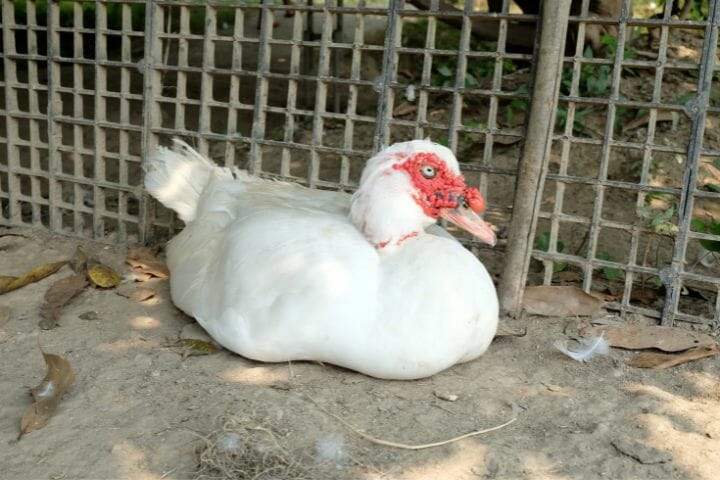
My Experience With Muscovy Ducks
I am a zoologist and have had the privilege of working alongside a rescue center in Costa Rica for the last few years.
Over the years, we’ve rescued and rehabilitated both wild and domesticated Muscovy ducks. Some had come in attacked by dogs. Others had been abandoned due to old age.
In my experience, Muscovy ducks are relatively easy to care for. Although they could become quite messy, they were friendly and relatively easy to tame.
This article will mostly explore domesticated Muscovies, but references to wild Muscovy ducks will be included.
What Are Muscovy Ducks?
Before we delve into caring for these ducks, we first need to understand what a Muscovy duck really is.
Firstly, it is important to state that there are both populations of wild and domesticated Muscovy ducks.
Domesticated Muscovy ducks are incredibly different from their wild ancestors. It is the domesticated Muscovy that can make great pets.
Domesticated Muscovies can be found worldwide, including in North America, Europe, and Asia. They are most often raised for their meat.

To Duck Or Not To Duck, That Is The Question
When we think of ducks, a quacking bird blissfully chilling on a lake may come to mind.
Well, that’s not the case for Muscovy ducks.
In fact, many people argue that Muscovies are descendants of geese and not ducks.
And whilst Muscovy ducks are technically ducks, they wouldn’t be far wrong.
All other domesticated duck species originate from the wild mallard.
Muscovy ducks, however, have been domesticated from the wild Muscovy duck, a species of waterfowl native to Central and South America.
What Sets Muscovy Ducks Apart From Other Duck Species?
There are three main differences that differentiate Muscovy ducks from other, mallard-derived ducks. This includes:
- Quacking
- Claws
- Caruncle
Let’s explore these in a bit more detail.
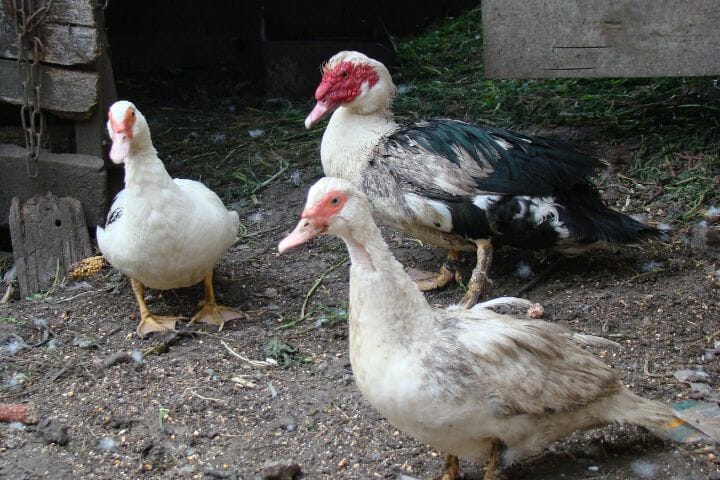
Quacking
Muscovy ducks are quiet. They cannot quack. Instead, they hiss.
Hissing in Muscovy ducks is the principal form of communication between conspecifics, whether it’s for positive or negative communication.
Claws
These claws are unique and serve an important purpose. They help anchor the duck to trees.
A duck in a tree? Yes, you read that right.
Wild Muscovy ducks nest in tree cavities, away from ground-dwelling predators. These nests are large and can be as high as 70 feet off the ground.
Caruncle
What appears to be angry-looking red warts across the face of a Muscovy duck does, in fact, have a scientific explanation. This is the caruncle.
The caruncles are so much more than just warts. They are brightly colored, fleshy lumps around the facial region of Muscovies. The caruncle typically appears at around five months of age.
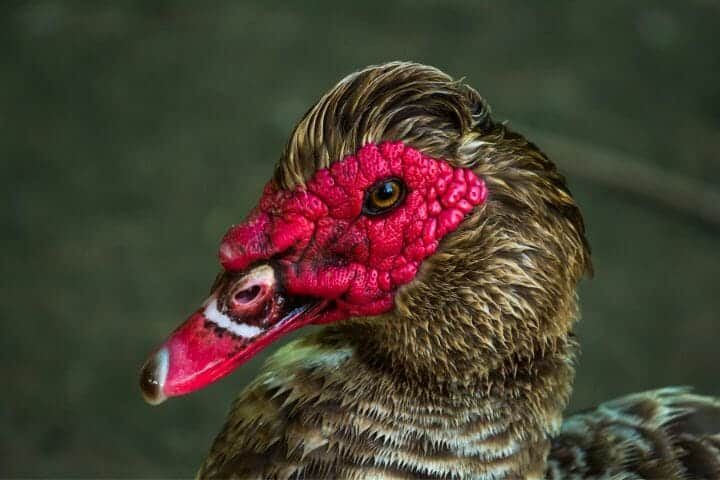
The caruncle serves some important functions. This includes:
- Protection – the caruncle grows when two ducks engage in a fight, and part of the skin becomes irritated. It is a form of cushioning defense.
- Communication – a bright red caruncle in males may suggest healthiness and can play a role in female choice. In females, their caruncle may turn orange, which is a signal to males that she is not interested in mating.
- Oil secretion – oil glands can be found beneath the skin. Muscovy ducks use this oil to preen their feathers to keep them waterproof.
Can I Own A Muscovy Duck?
There are some strict laws and regulations when it comes to owning Muscovy ducks in the United States.
Outside of their native range, they have become an invasive species. They out-compete local wildfowl species and are vectors of disease.
You cannot raise Muscovies to hunt, as this increases the likelihood of escapees and self-sustaining populations.
However, there are no laws surrounding owning or rescuing Muscovy ducks as pets as long as they are kept on your property.
Can Muscovy Ducks Fly?
Wild Muscovies are very competent fliers.
Domesticated Muscovies can fly, but their larger bodies make flying more difficult.
If you want to ensure your ducks will not fly away, you can clip their wings.
This is a pain-free procedure. However, if you do not feel confident, take your ducks to the nearest vet, and they will clip the wings for you. This has to be done every year.
Preparing For Muscovy Ducks
So, there we have it. That is a basic run-through of Muscovy ducks. Now, time to put the theory to the test.
What’s next?
Well, owning a Muscovy duck – whether purchasing or rescuing – is not a decision you should make on the whim.
Whilst Muscovies are relatively easy to care for, preparation is essential.
What Kind Of Shelter Does A Muscovy Need?
Domesticated Muscovy ducks are hardy animals. They can tolerate a range of environmental conditions.
However, their wild ancestors came from the hot and humid tropical forests of Central and South America.
So if you’re considering raising Muscovy ducks in the heart of Alaska, you will need adequate shelter. This is especially true if you are bringing back ducklings with no mother.

If you do have ducklings under the age of 8 weeks, they will need a secure, predator-free box (or get creative) with a heat lamp.
It is always advisable to create a closed-off area for your ducks at night. Oftentimes, you will find they won’t use it, especially if they are not tamed.
Instead, create an area with plenty of perches. This can be as simple as a pile of sticks on the ground, to overhead branches tied together.
Are Muscovy Ducks Easy To Tame?
If you hatched eggs yourself and you are the first living thing the ducks see, most ducklings will stick by your side and follow you around. This is known as imprinting.
Older Muscovies are more cautious in the beginning. However, with persistence, they are tameable.
Some of the Muscovies we rescued in Costa Rica were a little skittish at first.
I spent day after day sitting with them. I wanted them to become familiar with my face. I started scattering food nearby.
Every day, I would push my luck and try to get closer. Sometimes it worked, sometimes not. It was a classic case of “one step forward, two steps back.”
Eventually, and after a lot of patience, one started eating out of my hand. The rest is history.
If you do manage to tame your Muscovy ducks, please do not try and force yourself to touch them. They will come to you in their own time.
How Many Muscovies Should I Get?
Muscovy ducks are a social species. They do well within a flock.
As we were a rescue center, we only accepted injured and abandoned ducks.
However, from speaking to wildlife technicians and vets, it is suggested you should have at least three Muscovy ducks.

Feeding My Muscovy Duck?
From my experience, Muscovy ducks are opportunistic omnivores.
They will eat just about anything they can hunt. This includes nasty pest insects such as ticks and flies, as well as worms, fish, and even small reptiles.
In the wild, they are important predators of freshwater insects, such as mosquito larvae. They also maintain populations of weeds and algae.
Feeding your Muscovy duck garden scraps is also a great way to introduce nutrients and vitamins into its diet. Our rescues loved corn, carrots, papaya, parsley, and bananas.
However, you may want to purchase specifically designed food with added nutrients, especially if you are rescuing a Muscovy. Chicken food works just fine.
If adequate space is provided, you will not be required to feed a young Muscovy that often.
They will instinctively start to hunt for themselves. However, Muscovy ducks kept in a coop will rely on you to feed them.
Lastly, the season is another factor you should consider when feeding your Muscovy. In the summer, there are plenty of creepy crawlies to keep your bird full of protein.
However, come winter, they will require an extra helping of food.
Will Muscovy Ducks Eat My Garden?
If they have access to a grassy garden, it is more than likely that a Muscovy will destroy at least some of it.
Not only will they actively eat the grass, but they will also wreak havoc on patches when they’re on the hunt for insects and worms.
If you want to keep your ducks free-range, the easiest way to prevent damage to your garden is to simply fence off certain areas you do not want them to reach.
Alternatively, you can keep your ducks in a coop as long as they have sufficient space and amenities.
How To Set Up An Enclosure For A Muscovy Duck
I spent a lot of time creating a nice area for our rescued Muscovies, only for them not to use it.
They spent most of their time outside, foraging, bathing, or perching.
Due to the presence of raccoons, opossums, and coatis, we also brought our Muscovies back into the animal hospital each night. Other than that, they were quite content outside.
I will say, however, that if you want your Muscovies to breed, they will need a designated and protected nest area.
Domestic Muscovies will be happy to nest on the ground, so ensure there are plenty of sticks and hay available. Include tires, old dog houses, or even barrels.
Do Muscovy Ducks Need A Pond?
Fortunately, we had a couple of ponds dotted around the rescue center, which we converted to be used by the Muscovies.
In the hot weather, they loved bathing and cleaning themselves.
However, a pond is not essential to keep your Muscovies. Although, you should consider providing a water source of some description for your ducks.
The water does not need to be deep or even that big, just enough for your ducks to bathe. You will need to change this water daily, sometimes twice a day.
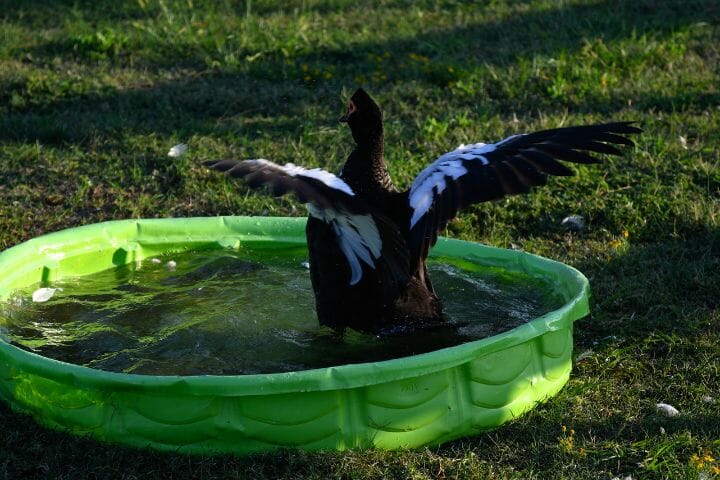
Are Muscovy Ducks Friendly?
Yes and no.
Never approach wild Muscovy ducks, and do not attempt to feed. If you see an injured wild Muscovy, consider calling your local wildlife rescue center.
Domesticated Muscovy ducks, on the other hand, can be incredibly loving. If given the right care, of course.
Don’t let the hissing put you off. Muscovies do this as a form of communication. They also wag their tails.
Our rescued Muscovy would greet me when I visited him in our animal hospital. I truly do think they are capable of forming bonds and connecting with caregivers.
Either that or they just want to stay on your good side to get food.
I would exercise caution should you have a nesting female. They can become very protective of their nests and young ducklings.
What Is The Best Way To Handle A Muscovy Duck
Due to their sharp claws, Muscovy ducks can cause some damage if handled incorrectly.
But fear not; follow these steps, and no blood will be shed:
First of all, do not chase your duck around. This will cause unnecessary stress for both you and the duck. Nine times out of ten, the duck will always win and evade capture.
Instead, crouch down low and offer the duck’s favorite food.
Place one hand on the duck’s chest and the other hand on the back of the duck to secure it.
Once the duck is still, move both of your hands over the wings and body and clamp down gently but firmly to secure them.
If possible, reach your hand all the way around their body to support them from underneath.
If the duck struggles a lot, release your Muscovy to avoid injuries. Only completely lift off the ground if your Muscovy appears calm and still.
If at all possible, you may want to position yourself, so you are out of the poop firing line.
Too many times, I focused on securing the wings and calming our rescues without thinking of all the poop!
Are Muscovy Ducks Good Mothers?
Muscovy ducks are very good mothers.
In the wild, Muscovies will nest high in trees to escape predators.
Domesticated Muscovies nest on the ground and can become aggressive whilst protecting their young.
Ducklings will stick close to their mother and follow her every movement. The mother, in return, will clean her ducklings and provide protection.
It may be worth separating the mother and ducklings (but make sure the mother is aware of where her chicks are) just to give you the peace of mind that all the chicks will survive.
I’ve heard of cases where the mother would wander off into the woods with her chicks, for the chicks to never return.
How Many Eggs Can A Female Muscovy Duck Lay?
A clutch of Muscovy duck eggs. A single clutch can have up to 16 eggs.
Unlike other egg-laying birds, Muscovy ducks do not produce eggs year-round.
Most females will tend to lay eggs in the spring or summertime when days start to get longer and warmer.
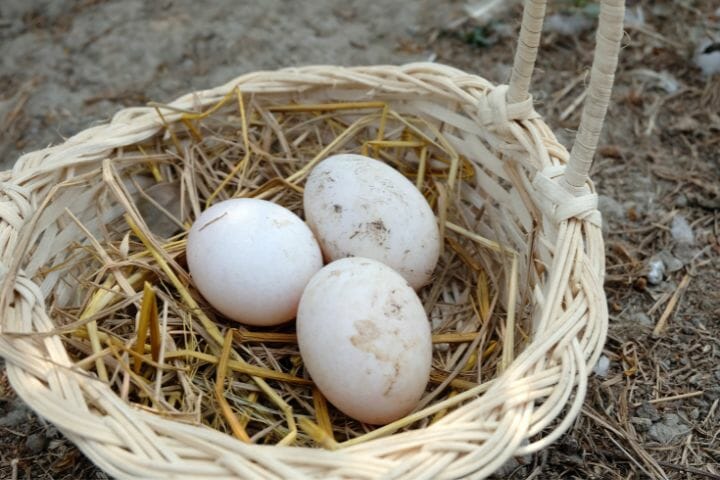
A single clutch can have upwards of 16 eggs; however, most females will lay significantly fewer than this.
In her lifetime, a female will lay around 120 eggs. This is considerably fewer than other duck species.
It can take up to 7 months for your Muscovy to reach sexual maturity and start laying eggs.
How Long Does It Take For An Egg To Hatch?
The incubation period for Muscovy ducks is around 35 days.
During this time, the mother duck will remain on her eggs for most of her time.
Unlike chickens, who do not leave their clutch, Muscovy ducks will leave incubating eggs.
However, she will only leave her eggs to drink, eat and poop. This is usually just a couple of times throughout the day.
As a result of her dedication, she will lose a lot of her body mass. Do not be alarmed. Do not try and force-feed her.
During nesting and incubation, minimize contact with your Muscovy duck.
However, ensure you change the water daily.
Are Muscovy Ducks Bred For Eggs?
Muscovy ducks are not typically bred for their egg production.
Having said that, those who have eaten an egg of a Muscovy say the taste is far superior to that of a chicken egg.
I’m talking rich, creamy, and decadent. A real treat.
If you’re expecting fresh eggs every day, Muscovy ducks are probably not the best choice.
Can Muscovy Ducks Be Raised For Meat?
Again, I have experience with rescuing Muscovies, not eating them.
However, I am told the meat is exquisite.
Muscovy ducks are lean. This means there is considerably less fat than the regular, mass-produced duck.
Therefore, if you are looking for a healthy alternative, consider trying Muscovy duck.
If you want to experience cooking Muscovy duck for yourself, consider this mouth-watering recipe below:
https://www.myrecipes.com/recipe/honey-orange-glazed-muscovy-duck-with-parsnip-mash
Frequently Asked Questions
Do Muscovy ducks need a coop?
Are Muscovy ducks noisy?
Will my Muscovy ducks fly away?
How messy are Muscovy ducks?
Why do Muscovy ducks have red faces?
Conclusion
If you give them the right care, domesticated Muscovy ducks make great, loving pets.
Make sure you change their water daily and provide a nesting box.
Do not force yourself to touch your ducks. If they are tame, they will come to you.
Everyone has a different experience when it comes to raising Muscovies. Thank you for reading, and I hope you enjoy the journey.
References
University of Florida, Suburban Sustainability, 2017
World’s Poultry Science Journal, Dec 2012


